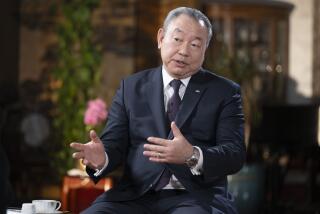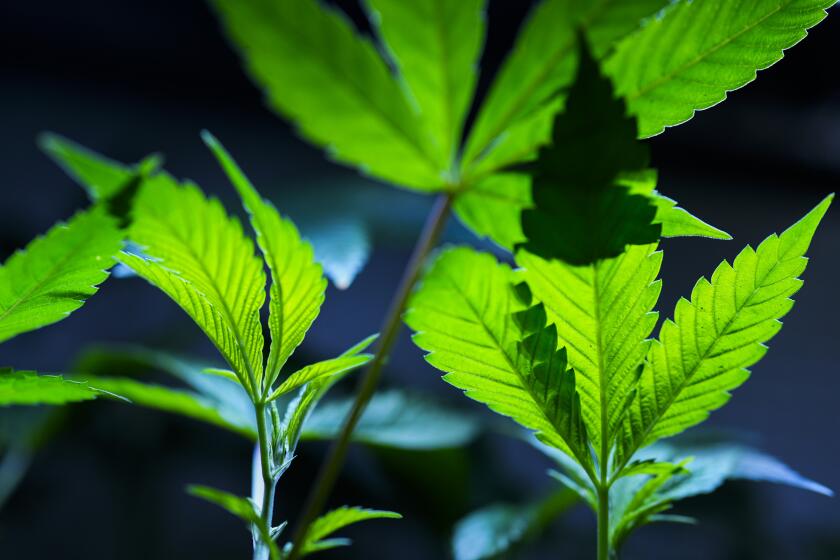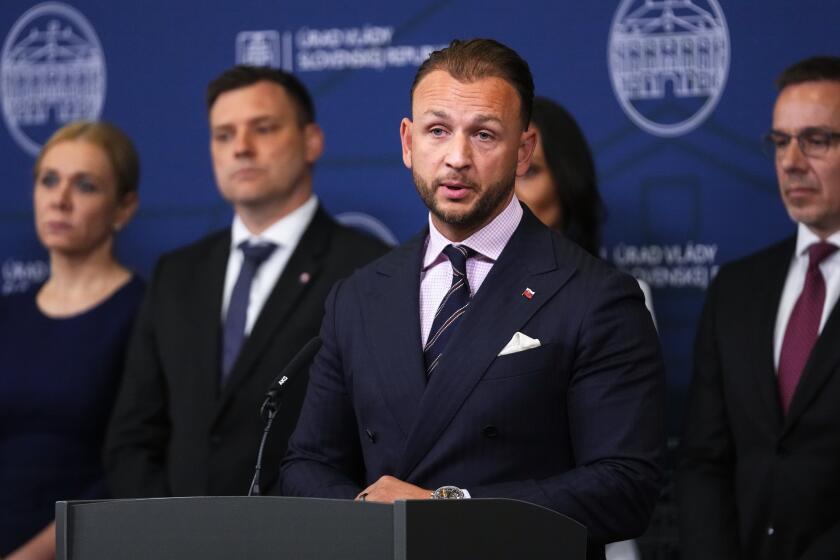Bush’s Taiwan Remarks Sow Global Confusion
What exactly did President Bush say? And what did he really mean?
From Beijing to Taipei, Tokyo to Hanoi and on to Canberra, policymakers and analysts are engaged in a giant guessing game to figure out exactly what happened midweek when the president said on a morning TV show that he would do “whatever” it takes to defend Taiwan, and even opened the door to deploying troops as one option. Many in Washington are wondering too.
The debate spanning the Pacific centers on the scope of the U.S. military role in Taiwan: Would it be men or just materiel? A front-line position or a simple support role?
Or is it, in fact, much ado about little?
It’s hard to get a single answer because no one seems to be reading from the same script. Or transcript.
And Washington isn’t helping. In the lone clear-cut explanation, the State Department, crafter of U.S. foreign policy, claims that nothing has changed in the U.S. approach to Taiwan in one day, one year or even 22 years. The White House claims that it heartily concurs, then blurs the lines by noting that the United States has an “obligation” to act if the island’s peaceful way of life is “upset by force”--and that the president meant what he said.
In China, the Communist regime denounced Bush’s “mistaken remarks” but declined to say whether it considered them tantamount to a change in policy.
Foreign Ministry spokeswoman Zhang Qiyue said Thursday that Beijing is “strongly indignant and opposed” to Bush’s comments, which came first during an interview on ABC and were later expanded on by the president in an appearance on CNN.
Zhang said the remarks showed that the U.S. had “drifted further on a dangerous road” that began with an announcement this week of the largest U.S. arms package in a decade for Taiwan, which Beijing considers a breakaway province.
But as to whether Bush’s comments represented a shift in policy, Zhang suggested that reporters ask the White House.
Some analysts in Beijing interpreted the president’s remarks as a fundamental shift from the long-standing U.S. policy of “strategic ambiguity,” designed to keep both China and Taiwan guessing about whether the U.S. would intervene militarily in an open conflict between the two.
Bush’s comments merited a strong Chinese response, said Yan Xuetong, director of the Institute of International Studies at Qinghua University. “I believe China needs to take more than rhetorical protest to help the Bush administration understand how dangerous this policy is,” he said.
But another Chinese analyst dismissed Bush’s remarks. “You cannot take a politician’s political rhetoric too seriously,” Lin Limin, a researcher with the China Institute of Contemporary International Relations, told the official China Daily.
Taiwan, meanwhile, called the new administration’s position “consistent” with a U.S. commitment under the 1979 Taiwan Relations Act. “We don’t judge U.S. policy based on one sentence,” said Chang Siao-yue, spokeswoman for the island’s Foreign Ministry.
Yet Taipei’s top representative in Washington, Chen Chien-jen, said Thursday that Bush’s few words reflected a “firmer” position and a “clarified” policy that sent a “strong message” to Beijing. “The words he used were not the words used before,” Chen told reporters.
Interpretations about exactly what had happened varied just as widely elsewhere in the Pacific region. In Japan, Defense Agency chief Toshitsugu Saito said the president had clearly made “a strong commitment to defend Taiwan.” In Vietnam, a Foreign Ministry spokesperson warned about the dangers of changing the status quo--assuming it had changed.
And Australia reflected the concern felt throughout the region. “We don’t want to see any wider tension escalate between the United States and China,” Prime Minister John Howard said.
The policy brouhaha showed no signs of quieting down Thursday as more American players joined the debate. The spin within Congress also differed widely--even within the same party.
Sen. John F. Kerry (D-Mass.) proclaimed on the Senate floor Thursday that the U.S. is committed only to selling arms, not to physically defending Taiwan. But Rep. Tom Lantos (D-San Mateo) said the president’s words marked a welcome policy shift because the time has come to “go beyond” a deliberately ambiguous policy dating back to the 1979 act.
“An unambiguous statement will guarantee that hostility in the Taiwan Strait will not take place,” he said.
In scathing language, Sen. Joseph R. Biden Jr. (D-Del.) questioned whether the president understood the ramifications of his words. Biden expressed alarm about Bush’s “utter disregard” for the role of Congress in authorizing deployment of U.S. forces. He also worried about U.S. allies on the Pacific Rim who provide bases for U.S. troops and might find their own relations with China compromised by the perceived policy shift.
“Words matter. Nuances matter,” Biden said at a Senate Foreign Relations Committee hearing.
Contrary to the president’s statement on ABC, Biden added, the U.S. is not obligated to defend Taiwan “with the full force of the American military” and hasn’t been since 1979, when the U.S. established diplomatic relations with Beijing and abrogated the 1954 Mutual Defense Treaty with the island.
The administration didn’t do much to clarify its position Thursday. During congressional testimony, Secretary of State Colin L. Powell played to both positions. He called China a “serious competitor for influence in the region.” Then he noted: “We’re not looking for enemies. We want to be friends with anyone who wants to be friends with us.”
Meanwhile, U.S. officials said they now believe that important intelligence may have been compromised when a U.S. Navy EP-3 spy plane was seized China April 1 after the aircraft collided with a Chinese fighter. Rear Adm. Craig Quigley, the Pentagon’s chief spokesman, said interviews with crew members indicate some intelligence loss.
*
Wright reported from Washington and Chu from Beijing. Times staff writer Paul Richter contributed to this report.
More to Read
Start your day right
Sign up for Essential California for news, features and recommendations from the L.A. Times and beyond in your inbox six days a week.
You may occasionally receive promotional content from the Los Angeles Times.







